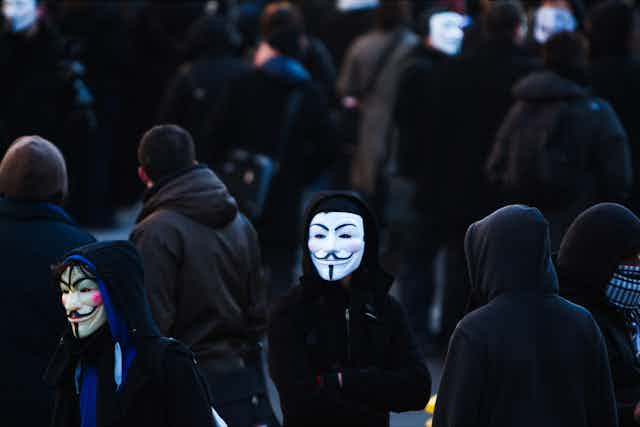It’s been a week since the terrorist attacks in Paris and the hacktivist group Anonymous has further expanded its online confrontation with the Islamic State (IS). Its campaign was originally captured under the #OpISIS banner, but is now titled #OpParis.
The initial operation was launched in response to the attacks on Charlie Hebdo, and since then, Anonymous claims to have taken down some 149 IS related websites and 5,900 IS videos.
While on the surface this seems like an overall positive outcome against IS, given its highly regarded and consequential online presence, the reality is much more complex and nuanced. It demonstrates the risks of vigilante style action being undertaken in areas of sensitive national security matters.
When not to take down IS content
Action in this domain, regardless of its quality and the implications, can be seen as inherently beneficial. But an absence of context, proper understanding and incongruent purposes can make the counter efforts of the state more difficult.
When a government is looking at IS content online, the context varies depending on the outcome it seeks to achieve and for the department or agency involved. In a law enforcement context, IS content can be used to form the basis of a search warrant or a control order, or as evidence in a prosecution.
For an intelligence agency, an IS website may prove to be a vital element in ongoing surveillance, or form part of a broader assessment of an individual or a cell’s behaviour.
Beyond this, even the military may make use of IS online content as part of offensive information warfare targeting.
The distinction here is that the mere presence of IS content, while negative in the discreet sense, is part of the broader apparatus that is IS. It is multifaceted and complex, as is the response to it by the agencies of national security.
It is simplistic to think that merely removing IS content from cyberspace is sufficient, or even necessarily positive in the overall sense. There can often be a greater good achieved by leaving certain pieces of content in play.
This greater good is not supported by the interdiction of people unaware of the broader operations of government agencies, flawed and less than perfect as they may be.
For the public’s safety
The purpose for which Anonymous removes IS content is relatively narrow when contrasted with the public protection purposes of the state.
When a government, in collaboration with those companies responsible, removes online content, it is because it has been deemed both detrimental to public safety and security. It’s also because it’s considered that the content does not serve any other additional purposes, such as those mentioned above.
But Anonymous removes IS videos because IS disagrees with, and acts against, free speech. This presents both an ironic contradiction and also a much more self-interested motivation for Anonymous’ actions.
Tolerating vigilante style action by people affiliated with Anonymous would be an easier exercise if they were in some way representative, rather than a self-appointed vanguard, acting in the name of a public good they have determined to be overwhelmingly important.
When things goes wrong
The actions of Anonymous are also undertaken in a publicity-seeking manner. As further details are revealed in relation to #OpParis, it has been demonstrated that some of the personal details hacked and publicised by Anonymous were inaccurate.
While the state is not free of these types of errors, democratic states are at least accountable to some form of electoral and rule-of-law consequences.
In this heightened political and societal environment in the aftermath of a terrorist attacks, when a group such as Anonymous errs in identifying an individual as an IS recruiter or financier, it places those individuals in substantial danger while remaining largely free of consequences.
This is separate from the fact that much of the process of obtaining the data in the first instance is likely criminal.
While the actions of Anonymous in a range of domains, and in relation to many issues, can be seen as an overall positive, there are some very sensible reasons as to why its followers perhaps ought not to play in the national security space.
The takedown of IS content is generally viewed as being of fairly low impact when governments are involved, let alone when a vigilante style organisation adds additional risks of exposing innocent people, and undermining broader efforts to counter IS.
Perhaps most importantly, it does nothing for the people of Syria or Iraq, or those suffering within the controlled territory of IS.


